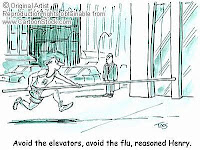New Report: Adult Obesity Rates Rise in 37 States, Obesity Rates Now Exceed 25 Percent in More Than Half of States
"In 1991, no state had an obesity rate above 20 percent. In 1980, the national average of obese adults was 15 percent. Now, an estimated two-thirds of American adults are overweight or obese"
The CDC has some striking maps on the epidemic. Following them for the past twenty years can be very convincing that we have a serious problem on our hand.:
Video of the change in US Obesity from 1985-2007
BMI vs. Other Measures
-The most common measure of obesity - BMI (Body Mass Index - weight in kg/height in meters) is a bit flawed. It does not distinguish between muscle and fat. Those that are extremely buff are likely to be considered overweight or obese by this scale. Researchers also consider waist to hip ratios and body fat percentage when analyzing weight. However these two measure are much more difficult to gather on a population level.
Should one consider herself overweight or obese if their BMI is over 25 or 30? I think you should consider your body fat percentage (should be less than 15% for men, less than 25% for women) and waist to hip ratio before drawing that conclusion. That being said the data from all three of these measures show a very dramatic incline.
Genetic Link?
Adoption studies provide insight on if the problem is due to the environment or genetics. While seeing how quickly these inclines have increased, environment must have a rather important role on the subject. However adoption studies show that adoptees weight are more highly correlated to their biological parents weight than adoptive parents weight - giving argument that obesity can be considered somewhat genetic.
Another argument for the genetic cause of obesity is the country of nauru. Nauru is a pacific island that currently tops in obesity at 94.5% of their adult population. Their story is rather interesting. In World War 2 they were deported from their country by the Japanese to a small food lacking island in micronesia. During that time a considerable portion starved to death (approx one third). After returning back to their country, the survivors lifestyle changed after gaining wealth and becoming much more sedentary. This can be considered a human experiment for the genetic link to obesity. The survivors from micronesia were the ones who had a better propensity to store food, but also the ones who can become more obese.
Should insurance companies increase premiums for the obese?
Health insurance should consider obesity when determining rate, but instead of punishing those who are obese they should reward those who are being active. If people got rebates for losing weight, that would be a little extra motivation. However it is more difficult to discriminate when the problem is partially genetic.
Should the government subsidize healthier food so it can be bought by the poor?
While healthier food such as fruit, vegetables and fish are pretty expensive - I don't know if subsidizing them will attract too many more poor customers. Our income inequalities in this country are problematic to say the least, and there isn't any easy solution to this problem. My current thought is to tax foods with high percentage of trans and saturated fats, sort of like what is currently done with cigarettes.



